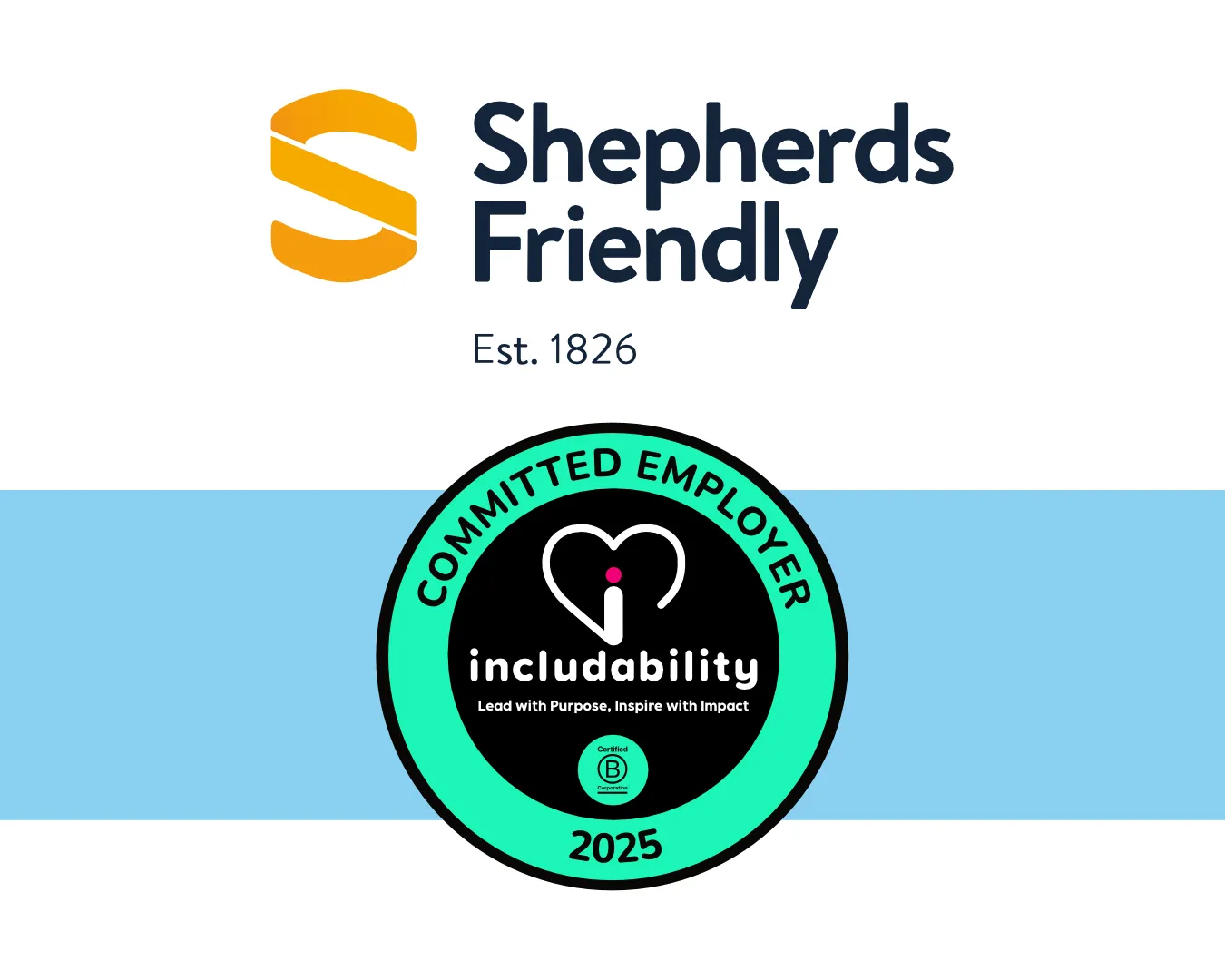Money management tips for greater financial security
Edward chats exclusively to Includability about money management tips, employee salaries, and the wellbeing people feel from the greater financial security can have from forward planning and negotiating.

Financial Wellbeing Tips with Edward Challis MBE

Money management tips, employee salaries, and the wellbeing people feel from the greater financial security
Edward Challis MBE is a Thought Remover at Outliers Wellbeing. Although that sounds like a description of a dystopian villain, his job is not to curtail freedoms, but to remove anxiety-driven thoughts and give people a sense of wellbeing from not having to worry about their finances as much.
After leaving his first career in the military, he became a self-employed consultant. He says he has gone from a career where he has never had to worry about his finances as everything was taken care of, to being fully responsible for his own income, taxes and budgets for the first time in his working life.
Edward chatted exclusively to Includability about money management tips, employee salaries, and the wellbeing people feel from the greater financial security can have from forward planning and negotiating.
Should employers post salary range in job adverts?
It’s good to know what the amount someone would be making in a job is. Where I find it helpful to get a grip with this is where people have confidence in their own ability to say what they are worth. If there is a value of to the job that is done well, then that value should be advertised.
If someone is doing a good job and providing value to a company, and they continue to do that over the long-term, the maybe there can be a staggered process, but there can be more clarity around especially large range brackets, rather than being dependent on prior experience, that’s not a great way of doing it.
When a range is given, we have more certainty. When we have certainty, we can start to plan. When we can plan, we have control, and when we have control, we reduce the stress associated with what may or may not be. If you have a line in the sand you can work from, it can give you more confidence in what you will be bringing in financially, and you can plan better based around that.
Should candidates disclose their current salary details during interviews?
That is up to the individual. If it makes them feel better to do that and gives them a line in the sand, they can draw to show the employer what their value is to a company, then they should.
When negotiating salaries, it’s worth focussing on the value they bring to the company, rather than the pounds and pence figure they earned previously. That can lead to comparison and comparison stops you from looking your best at interview.
How can job seekers get the best deal when negotiating salary for a new job?
If you know what you need, financially, to make ends meet, and preferably if you have more of a plan looking forward for the extra investments you will need. A good way of looking at this is if you only need 90% of your salary to pay your bills and everything you need to buy, and there is at least 10% left over to be able to plan for the future, maybe you want to have children or maybe do something with your job. This will be bespoke to the individual, but if you know what you need, and you know what your minimum is that you are are happy to be able to turn up to work and feel valued, and not be resenting the job they do, that would be a good place to start.
It can also make it a very clear decision, especially if you are concerned with negotiating and the stress that might bring. Being able to have your line in the sand and knowing what you would be able to walk away from and anything above that will allow you know you can put some money away for the future.
There will be other things to take into consideration, it’s not just the number on the salary, it could be what the employer provides as a pension, or any health benefits. There will be a number of ways to consider value of an organisation other than the salary figure.
What can employees do – short of threatening to leave their organisation – to ensure they are paid what they are worth?
This is similar to finances within a relationship, or between friends. An open and honest conversation about where things are is important. It’s also important to have an atmosphere of psychological safety in where people feel they can come and have those sorts of conversations, and this related back to coming up with a plan and taking control.
It allows for a step procedure to be taken if the company can allow it and that person adds that amount of value to the company and they do not want to lose it. A company will have to spend a lot of money on recruitment, advertising and the interview process to replace someone. It could be in everyone’s best interest to engage in negotiations. Certainly, from a wellbeing perspective, open and honest conversations are important because if your terms cannot be met, it’s not going to relieve your financial burden and you cannot stay in your role and continuing what you are doing.
Should employees discuss their salaries openly with work mates?
There are two schools of thought on this. One is if someone has negotiated a better salary, that might leave someone feeling undervalued if they are doing exactly the same number of hours, the same job, or even a better job adding more value to the company. To then see that they were simply not as good at negotiating, whether during the interview or another stage, and realise this is what their worth is judged on, that might not be good for their wellbeing.
On the other hand, if they know that are working just as hard as someone else and know they are being paid more, or less, it could be a good standpoint to say to the employer, ‘This is what the problems I am facing at home, I know I am not the highest paid person in this role, I think it is a fair step to take to get more.’ It could give them that feeling of wellbeing confidence within their own negotiating ability.
What other ways can people improve their financial security?
Common things we tend to do that are bad for our own finances and wellbeing are; comparing ourselves to others, living beyond our means and not taking any action to improve by keeping the status quo. That is typically what we do as it is very important to us to be seen to do the right things than actually doing them.
What people need to understand is to work out what they need and what they want and can come up with a plan to achieve these two things, or to start getting on the right path towards them. It would give them such a better feeling of wellbeing than constantly chasing a larger salary or comparing themselves against others.
A thorough breakdown of income and outgoings and looking at what might be overspend on things not actually necessary. It can be a good exercise for people who can find out they have some monthly subscription that they don’t utilise anymore and can make immediate savings by re-evaluating where their money is going. When they know what their money is needed for, they can feel much more secure.
How closely related is financial security to a person’s overall wellbeing?
No amount of deep breathing and meditation can fix your mortgage/rent demands or relieve the stress of financial pressure. Financial pressure is the number one cause of stress within the UK. If this is something you are constantly worrying about, it is easy to get that stressful feeling because it is easy to see if you are in the black or in the red.
Carl Richards says, ‘It’s easy to lump finances into the maths department because it involves numbers, but it should be in the phycology department because as soon as you start talking about those numbers, it evokes feelings.’
It is something we can’t escape from either because if you are out, or at home, it’s always around you and you’re always being advertised to about it. It is everywhere.
It is one of the fundamental stages of wellbeing is; when we realise we can take more control than we thought we can, and when it is under control, it will have a much greater impact on our wellbeing.
From your experience in the military, does having a regimented approach to personal finances help?
My military career is probably the time I was least regimented with my finances that I have ever been. Everything was done for me and I didn’t realise the value of it. I had a pension paid, and I didn’t have to contribute to it personally, my tax was worked out for me. I didn’t have the stress associated with filling out self-assessments.
I have a far more regimented financial routine now which provides comfort to me and my feelings around financial wellbeing. In the military we have standard operating procedures which removes that need to think about things like finances. My job title at Outliers is Thought Remover, I remove the need to think about how to get it, what to do with it, how can I best use it? How do I respond to it? All these thoughts can be removed by having a financial plan in place.
A personal example of being self-employed, there are some months where more money comes in and some months where less comes in. I calculate my percentage after all my regular outgoings, whether that is rent or mortgage, food that I need to survive rather than meals out and paying for the car to get to work.
Once those are worked out, it’s best to work out anything extra into different pots, whether that’s for your children, for a pension, for investments, or for personal things. If you do that, you won’t need to think about how much is there, it has already been worked out.
What are some of the best money management tips to help improve mental health?
Plan and know what is required. I am always surprised how many people don’t know how much is going in and out of their accounts each month. They are either always feeling the pinch or always scrimping to get that last glass of wine by the end of the month.
Until you have analysed it, you will never gain control of it. It is not the sexiest things to do, but it is essential. A detailed analysis will help you make your plan about what it is you require, then it’s about having the consistency around it.
Planning shouldn’t feel like doom and gloom, it should bring the feeling of joy and excitement back about having control and being able to spend well. It shouldn’t all be about saving, investing or pensions. It should be about striking that balance because everything you do in life, whether that is finances, diet, or doing a chore, you know you should but is not your favourite thing to do. If you keep the balance, you will be able to maintain it, when we maintain it, we’ll have the consistency around it, and when we are consistent, we will get the results we desire.
Related resources & events
Sign up for our newsletters
We have an employer and Job seeker newsletter giving you all the latest information in one easy and digestible email. Sign up today for news and job advice straight to your inbox.









